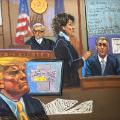
Asked about Trump's comments that he has the right to meet the whistleblower — who the President has called his "accuser" — Rep. Adam Schiff called that "a blatant effort to intimidate witnesses."
"The President wants to make this all about the whistleblower and suggest people that come forward with evidence of his wrong-doing are somehow treasonous and should be treated as traitors and spies," Schiff said. "This is a blatant effort to intimidate witnesses. It's an incitement of violence and I would hope and we are starting to see members of both parties speaking out against attacking this whistleblower."
Schiff reiterated the whistleblower has the right to remain anonymous and said Congress would do "everything in our power" to make sure that the person is protected.
Pelosi added that she believes that Trump "probably doesn't realize how dangerous his statements are" when he says he wants to expose the whistleblower and those who provided him or her with the information.













